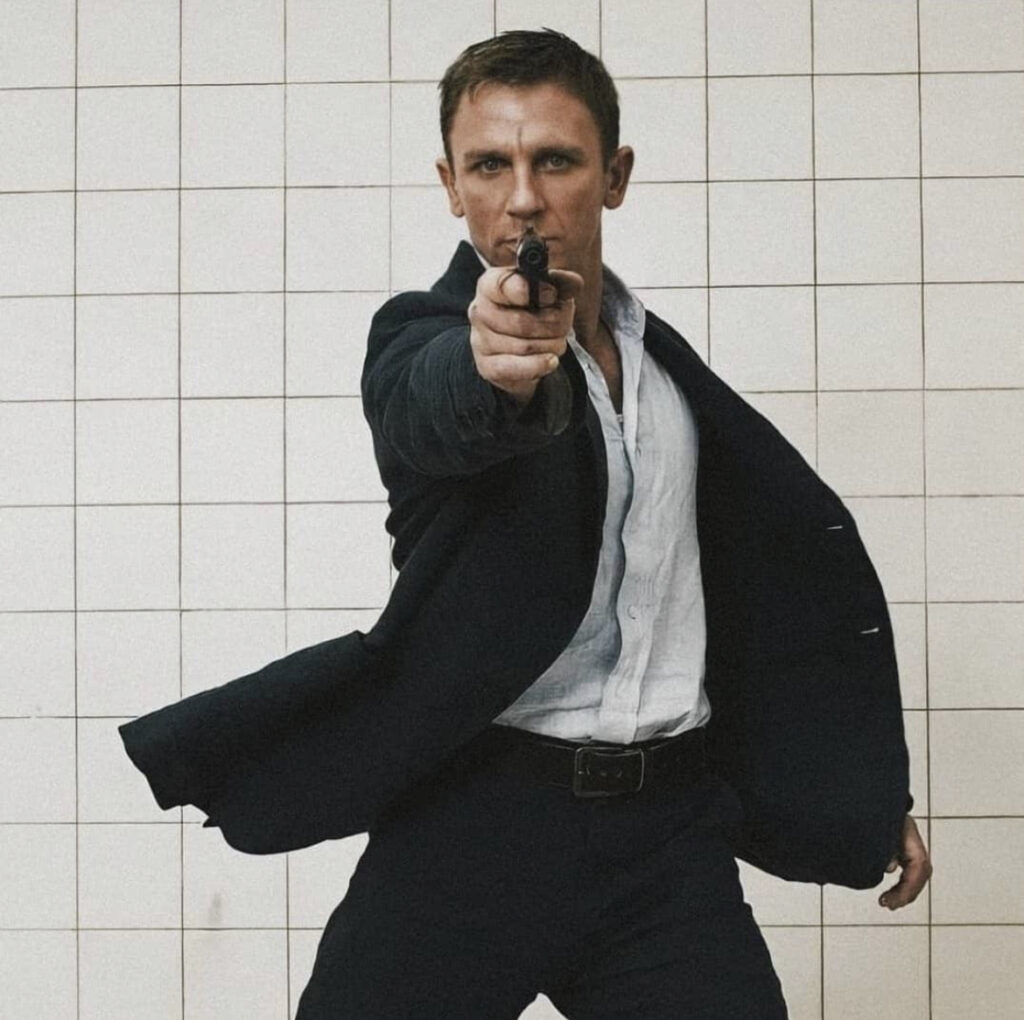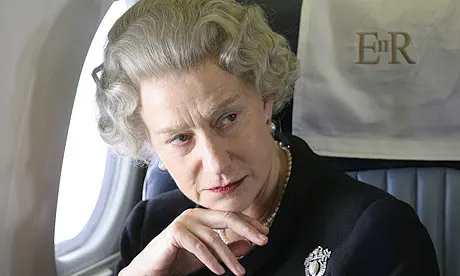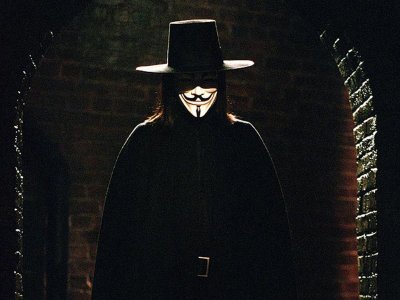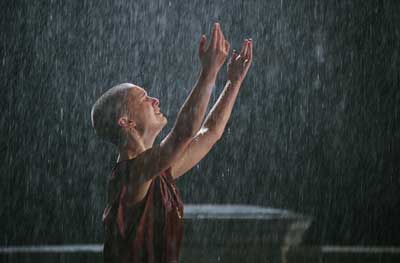The Good German (2006)
DIRECTOR: Steven Soderbergh
CAST:
George Clooney, Cate Blanchett, Tobey Maguire, Beau Bridges, Jack Thompson,Ravil Isyanov, Tony Curran, Christian Oliver, Leland Orser
REVIEW:
The Good German is director Steven Soderbergh’s (Traffic, Ocean’s Eleven) adaptation of Joseph Kanon’s 2001 novel, but Soderbergh chose not to simply do a straightforward filming of Kanon’s book, but used it as his chance to attempt a film experiment of his own- making the movie, set in 1945, as if it had actually been made in the 1940s. Continue reading
Casino Royale (2006)

DIRECTOR: Martin Campbell
CAST: Daniel Craig, Eva Green, Mads Mikkelsen, Judi Dench, Jeffrey Wright, Giancarlo Giannini, Caterina Murino
REVIEW:
With Casino Royale, Martin Campbell has done for 007 what Christopher Nolan did for Batman with Batman Begins the year before: reboot a floundering film franchise back to the basics and start afresh, as if none of the previous films happened. This is Bond stripped down to the nitty gritty. There are no gadgets, no Q, no Moneypenny, restrained sexcapades, and a Bond who’s the most serious he’s been in decades. The iconic line of “Bond, James Bond” isn’t uttered until the closing scene, and the James Bond theme is only heard in brief, subdued snippets until finally playing in full over the ending credits. Even the opening sequences’ conspicuous lack of the expected naked women indicates this “new” series’ direction. This Bond still enjoys attractive women and Aston Martins, he still drinks Martinis, and he still occasionally slips into a tux in glamorous international locales, but the mission holds most of his steely-eyed attention. Those who grew up on the campy tongue-in-cheek charm, nifty gadgets, and wildly over-the-top action of Roger Moore and Pierce Brosnan’s outings may find this Bond disappointing, but others welcomed it with enthusiasm as the first since Sean Connery, and maybe the first ever, to truly portray the cold-blooded professional killer from Ian Fleming’s original novel series (it’s based on Fleming’s novel of the same name, and while other Bond films have used the names of Fleming novels while jettisoning most of the plots, this one follows its namesake fairly closely), before that perception of 007 was overtaken by the ultra-suave super-spy action hero and ladies’ man.
The Prestige (2006)
DIRECTOR: Christopher Nolan
CAST:
Hugh Jackman, Christian Bale, Scarlett Johansson, Michael Caine, Rebecca Hall, David Bowie, Andy Serkis, Piper Perabo
REVIEW:
Director Christopher Nolan and his brother, screenwriter Jonathan Nolan, share not only obvious intelligence, but a fondness for complex plotlines. Continue reading
The Queen (2006)

DIRECTOR: Stephen Frears
CAST: Helen Mirren, Michael Sheen, James Cromwell, Helen McCrory, Alex Jennings, Roger Allam, Sylvia Syms
REVIEW:
With The Queen, director Stephen Frears and screenwriter Peter Morgan set out with several agendas: humanize the British monarch while at the same time critiquing the out-of-touch isolation of the royal family, and chronicle in docudrama fashion the key time period in the immediate aftermath of Princess Diana’s death, and the fledgling relationship between Queen Elizabeth II and newly-elected Prime Minister Tony Blair. It has succeeded on all fronts, turning what could potentially have been a dry, stuffy, talky affair into a fascinating and compelling drama and character study. One needn’t be a royal family aficionado (though of course that helps) to find The Queen engaging viewing.
Continue readingThe Illusionist (2006)
DIRECTOR: Neil Burger
CAST:
Edward Norton, Paul Giamatti, Jessica Biel, Rufus Sewell
REVIEW:
The Illusionist is the kind of low-key, independent, art house fare that often gets lost in the shuffle among the action flicks and romantic comedies, which is kind of a shame, because while it aims to be fairly lightweight entertainment, isn’t anything terribly ambitious, The Illusionist is a lot of fun- a pleasant, enjoyable brew of romance, mystery, and magic. Continue reading
X-Men 3: The Last Stand (2006)
DIRECTOR: Brett Ratner
CAST:
Hugh Jackman, Patrick Stewart, Sir Ian McKellen, Famke Janssen, Halle Berry, Kelsey Grammer, Anna Paquin, James Marsden, Shawn Ashmore, Aaron Stanford, Rebecca Romijn, Ellen Page, Ben Foster, Vinnie Jones, Josef Sommer, Bill Duke
REVIEW:
X-Men 3: The Last Stand, the third installment of the original X-Men trilogy, is a mixed bag that veers from some of the best scenes in the series to a misjudged mess that desecrates some key characters and is crammed with more material than it can handle. Continue reading
The Da Vinci Code (2006)
DIRECTOR: Ron Howard
CAST:
Tom Hanks, Audrey Tautou, Ian McKellen, Jean Reno, Paul Bettany, Alfred Molina, Jürgen Prochnow
REVIEW:
Ron Howard’s film adaptation of Dan Brown’s novel The Da Vinci Code was preceded by an extraordinary amount of controversy over certain of its plot points which seemed to take on a life of its own, raising the movie and the theological and historical questions it raised into something greater than the film itself. Continue reading
V For Vendetta (2006)
DIRECTOR: James McTeigue
CAST:
Hugo Weaving, Natalie Portman, Stephen Rea, Stephen Fry, John Hurt, Tim Pigott-Smith
REVIEW:
Based on the controversial graphic novel by Alan Moore, and produced by the Wackowski brothers behind The Matrix, V For Vendetta mostly succeeds at serving up both entertaining action and a few eerily timely bits of political commentary, and represents a case of being entertained without having to leave your brain at the door.
On November 5, 1605, as many will know, a man named Guy Fawkes attempted to blow up Parliament and was hanged for his trouble. In the future, with war and a deadly biological terrorist attack (or at least that’s the official story) leading to order being restored in Britain by a Fascist totalitarian government, a man known only as V (Hugo Weaving), who hides his burned features behind a Guy Fawkes mask, seeks to unleash a wave of theatrics, rabble-rousing, bombings of London landmarks, and assassinations of prominent government officials that will culminate in the destruction of Parliament on Guy Fawkes Day. Like the man he emulates, V is either a freedom fighter or a terrorist depending on who you talk to. This is the dilemma faced by Evey Hammond (Natalie Portman), an ordinary citizen whom V saves from rape by the thuggish police after being caught on the street after curfew and then casually invites to watch as he detonates the Old Bailey building, the opening salvo of his one-man fight. The dictatorship, headed by the rarely-seen High Chancellor Sutler (John Hurt), tries to maintain a facade of control by explaining the building as a planned demolition, but V theatrically takes over a major news network to set the record straight. Over the next year, V moves like a wraith through London, simultaneously setting his government overthrow in motion and carrying out a personal vendetta against the government officials involved in his past sufferings. Evey tags along, not entirely willingly at first, then having to decide whether to escape V or support him. Meanwhile, Inspector Finch (Stephen Rea) is leading the investigation to stop V, but in the process stumbles across buried atrocities that make him question whether the real villain might be his own government.
 V for Vendetta is a rousing and thought-provoking experience even when it threatens to lapse into overwrought chaos. Like The Matrix, it’s bursting with ideas beneath its stylized action surface. It contains any number of moments to get the pulse quickening and the nape hairs standing, and asks tough questions about how far we should go in the name of security, and what defines a terrorist. The filmmakers also don’t let the stylized look and feel overwhelm the human element. In fact, the most indelible part of the movie is a lengthy subplot in which Evey reads the letter of a lesbian prisoner tortured and murdered by the government, that is so striking because its inclusion is so unexpected. And it’s hard not to see shades of Phantom of the Opera in the relationship between V and Evey. Like The Phantom, V hides disfigurements behind a mask and threatens to let personal vengeance overwhelm his claims of righteousness.
V for Vendetta is a rousing and thought-provoking experience even when it threatens to lapse into overwrought chaos. Like The Matrix, it’s bursting with ideas beneath its stylized action surface. It contains any number of moments to get the pulse quickening and the nape hairs standing, and asks tough questions about how far we should go in the name of security, and what defines a terrorist. The filmmakers also don’t let the stylized look and feel overwhelm the human element. In fact, the most indelible part of the movie is a lengthy subplot in which Evey reads the letter of a lesbian prisoner tortured and murdered by the government, that is so striking because its inclusion is so unexpected. And it’s hard not to see shades of Phantom of the Opera in the relationship between V and Evey. Like The Phantom, V hides disfigurements behind a mask and threatens to let personal vengeance overwhelm his claims of righteousness.
It’s telling of Hugo Weaving’s acting ability that he manages to generate such a strong, charismatic screen presence without once showing his face (his mask is unmoving, meaning he has no way of conveying even a hint of emotion with anything other than his voice and body language). Weaving uses his meticulously precise enunciation and commanding vocal tones to great effect- he delivers a rapid-fire monologue in which every word starts with v that has to be heard to be believe- and also gets to engage in a little Errol Flynn-style swashbuckling (although the fact that V’s features are hidden makes it impossible to determine when it is Weaving and his fight double). Natalie Portman is adequate, and at various times more than adequate, but her performance is a little uneven, and her somewhat forced English accent is somewhat distracting. Portman is particularly good during the infamous torture scene where her head is shaved, but also a few too many moments where she doesn’t seem to quite have quite a firm handle on her character. More solid is Stephen Rea, who uses his usual hangdog demeanor to good effect as Inspector Finch. In fact, despite his low-key performance, Rea’s Finch could be said to be the most three-dimensional and sympathetic character in the movie- a man with a job to do who finds nothing about his job is turning out as simple as he expects. In smaller roles, Stephen Fry is a talk show host who uses his program to slip in dissent against the government and befriends Evey, and John Hurt spends 99% of his limited screentime with his ever-angry visage amusingly projected onto a wall-sized television monitor faced by a half-circle of dwarfed underlings like some embodiment of Big Brother while he snarls and thunders about V’s antics. As his secret police chief henchman, and arguably the real primary villain, Tim Pigott-Smith is suitably oily.
 The climax is easily the weakest thing about V for Vendetta. In particular, our final brief face-to-face with Chancellor Sutler is disappointingly anti-climactic. One wonders if the filmmakers were making a statement about some dictators being figureheads to the real power behind the throne, or one’s public image not matching up with the real person, but in any case, Sutler turning out to be so pathetic kills the momentum provided by a centralized hub of villainy to battle against, and once he’s quickly here and gone, all we have left is a shootout enlivened with some (arguably too many) moves obviously inspired by The Matrix, and the destruction of Parliament, which seems a little pointless. I understand a large part of V’s mission is symbolic, creating grand spectacles to snap the public out of their apathy, but since the dictatorship has been effectively destroyed by this point, it seems the gratuitous annihilation of a historic British building. Then again, maybe we’re not supposed to be sympathizing with V by this point. In any case, the climax is disappointingly flat, even with the cool fight scenes and massive explosions, considering the build the narrative had generated leading up to it. The dictatorship goes out with a disappointing and rather anti-climactic whimper, even if V and Evey send it off with a closing bang.
The climax is easily the weakest thing about V for Vendetta. In particular, our final brief face-to-face with Chancellor Sutler is disappointingly anti-climactic. One wonders if the filmmakers were making a statement about some dictators being figureheads to the real power behind the throne, or one’s public image not matching up with the real person, but in any case, Sutler turning out to be so pathetic kills the momentum provided by a centralized hub of villainy to battle against, and once he’s quickly here and gone, all we have left is a shootout enlivened with some (arguably too many) moves obviously inspired by The Matrix, and the destruction of Parliament, which seems a little pointless. I understand a large part of V’s mission is symbolic, creating grand spectacles to snap the public out of their apathy, but since the dictatorship has been effectively destroyed by this point, it seems the gratuitous annihilation of a historic British building. Then again, maybe we’re not supposed to be sympathizing with V by this point. In any case, the climax is disappointingly flat, even with the cool fight scenes and massive explosions, considering the build the narrative had generated leading up to it. The dictatorship goes out with a disappointing and rather anti-climactic whimper, even if V and Evey send it off with a closing bang.
Even so, V for Vendetta is frequently thrilling, frequently thought-provoking, possessed of both a mind and a heart, and serves up a far richer experience than your average action thriller.
***